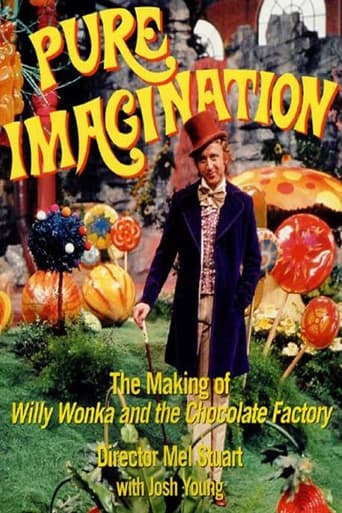Scroobious
Watch this.This is the kind of documentary that couldn't have been made, or at least not as well, before the advent of camcorders. The story is basically that of a battered family, ending in murder. It raises questions of what murder and justifiable homicide are... and leaves the answer to the viewer.The most haunting aspects of this film are the homemade footage in which the question is perpetually forced upon the victim/murderer... Wendy? Wendy? The subject is forced, both by her attacker and the filmmaker to look into the camera and decide to answer either honestly or dishonestly.The version I saw was the HBO documentary called Every F*ing Day, and that title seems much more appropriate. This movie gives a strange new meaning to familial bonds and love, and it leaves you hurting to find out how anyone can come out of such a situation intact.
Lisa W.
I saw One Minute to Nine at Locarno Film Festival in 2007 and it has not left my mind since. There are few documentary films that leave an impression on me, mainly because the subject matter always seems to be marred by outdated and formulaic methods (i.e. talking heads and unnecessary captions). This was not the case with One Minute to Nine. Not only is One Minute to Nine incredibly moving, but it is also innovative in its style. The full story of Wendy's struggle to overcome the violence in her marriage is revealed to the audience progressively and allows the viewer to understand Wendy's story naturally almost as if Davis is granting the trust necessary to reveal such a horrific story. It is the type of film that leaves you feeling so aware and united with Wendy that it would be impossible to forget. Naturally questions are raised throughout the entire film. In my opinion, trying to answer all of these questions would take away from the relationship that the viewer has built with Wendy in her last five days before going to prison. Instead, these questions are left unanswered and seem to parallel Wendy's own inability to comprehend the injustice she has faced. This is not a documentary that attempts to resolve Wendy's struggle, but to bring it to light. By not explicitly addressing the questions raised throughout the film, I feel Davis is also allowing the audience to remain frustrated by domestic violence rather than placate them with possible explanations or solutions. In this film, the unexplained resonates strongest.
Corey_Mitchell
Tommy Davis's brilliant documentary One Minute to Nine lays out the case of Wendy Maldonado, 35, a mother of four boys, who murdered her husband of nearly twenty years, Aaron, 36, on May 1, 2005.One Minute's first minute wastes no time in setting up a sense of uneasiness that permeates throughout the film. Seemingly innocuous home video footage of young boys sledding in the snow, juxtaposed with an eerily dark ambient piano-based soundtrack set the mood for an unusual trip ahead. The capper is a split-second shot of a man, presumably the boys' father, who glares into the camera lens almost as if he is looking directly through the person shooting the video.From there, the film shifts to a leisurely paced discussion with an attractive, yet tired looking, Wendy Maldonado. At first, the viewer is unaware of her significance. Her purpose is not immediately thrust into the viewers' laps. Instead, Davis allows us to get to know who this young, pretty, likable woman is and warm up to her instantly.This is followed by several of her family members, including three of her four boys and her mother. The whole family seems very loving toward one another. However, an undercurrent of tension is faintly apparent. Eventually, it is revealed that Wendy has murdered her abusive husband, Aaron, and it is only a matter of days before she is to be sent off to prison for ten years. She and her family are getting their affairs in order and Wendy is able to reveal the horror of what happened behind the walls of their Grants Pass, Oregon home.Aaron Maldonado apparently was a video hound. He loved to shoot footage of his young lovely young bride and their playful teen courtship. This was followed by a teenage marriage and a pregnancy. The couple gave birth to a girl who, unfortunately, passed away after only nine days. Despite this early tragedy, the couple forged onward and had four more children, all boys. Photos of a very pregnant Wendy, baring twins, revealed the couple to be happy and in love.According to Wendy, however, Aaron began to change. As the boys grew up, he used to pick on them quite a bit. He also became sterner with Wendy and had developed a quick temper. He also started to seem to be losing it quite a bit. Aaron professed to his wife that he dreamed of becoming a serial killer, one on par with the Ed Geins and Charles Ings of the world. He wanted to capture his prey, seclude them in a basement and torture them for as "long as it took for them to die." He then proclaimed he wanted to skin their bodies and consume their flesh.Despite these glaring warning signs, Wendy stuck around.Aaron's teasing of the children began to escalate, especially in regard to their oldest son, Randy, whom he began to smack around. He started beating Wendy, too. He allegedly bruised her repeatedly and even knocked out several of her teeth with his fists.Some of the most disturbing portions of One Minute to Nine are culled from the family video footage during this time frame. A few pops to the head of his kids begins the transformation. One shot of him teaching one of his little boys, probably no more than two or three years old, how to shoot a shotgun is devastating. Finally, Aaron's desecration of a dead baby deer, illustrated with a flying kick to the head of the dead animal, and then the latter supping of its blood from its eviscerated belly, are mortifying.Again, despite the ever-escalating warning signs, Wendy Maldonado chose to stick by Aaron's side.Throughout the first 2/3 of the film, Davis pulls a nice red herring in regard to the oldest son, Randy. References are made to him in the past tense, as if he may be dead, possibly at the hands of Aaron.It is the reveal that Randy actually helped kill his father, however, where I lost a little bit of sympathy for Wendy Maldonado. I know the appropriate thing to say in regard to domestic abuse cases is that the abuser created an environment in which the abused feels he or she is unable to escape. Indeed, Wendy claimed that Aaron threatened her with death if she ever told the police about his misdeeds. He supposedly even threatened her that if she ever took off, he would go after her family members and kill them one by one until he found her.For me personally, I have a very difficult time understanding how she would allow her son to participate in the brutal killing of his father, regardless of what he had done to her and the boys. I understand that there are serious problems with law enforcement in regard to domestic violence and that the authorities are not always reliable, as is evidenced in the movie, but I still have a hard time reconciling the fact that she would allow her son to participate in the murder.That does not, however, detract from the brilliance of the film-making on display. It is, rather, a testament to Davis' skill that he can wring so many disparate emotions out of his viewers.Indeed, by the end of the film, you have to ask yourself if justice has been properly served? Did her son deserve more than just six years for his part in the crime? Should Wendy be locked away for more than the 10 years she was sentenced to? Or, were they both wrongfully convicted? Should there be an expansion of the self-defense laws as posited by the judge who sympathized with her plight? These are but a few of the powerful questions raised by Tommy Davis' excellent documentary, One Minute to Nine. Thankfully, the film allows the viewer to make up his or her own mind.

